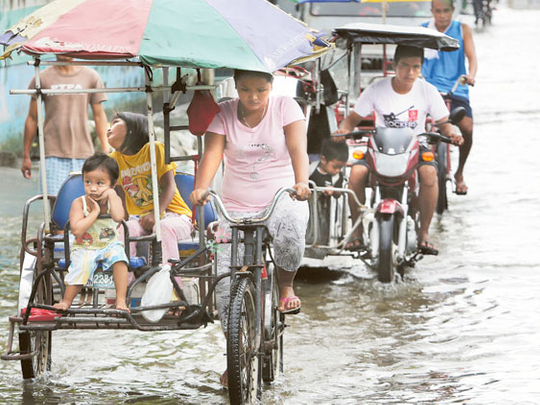
Manila: Motor-tricycles and motorbikes have eclipsed the jeepney as the ‘King’ of Philippine roads and now contribute a large percentage of harmful emissions that Filipinos breathe in every day.
A study conducted by the National Centre for Transportation Studies (NCTS) of the University of the Philippines said these two types of motorised personal and public conveyances are responsible for much of the dirty air in urban and rural areas of the country.
Tricycles and motorcycles are responsible for 45 per cent of all volatile organic compound emissions that destroy the ozone layer and worsen the greenhouse effect, the NCTS said.
“The tricycle sector represents the biggest number of public transportation mode in the Philippines,” said the NCTS in a study on intermodal transport.
In the provinces as well as the city, there are more people who rely on tricycles for public conveyance compared to public utility jeeps or “jeepneys”.
One of the reasons is that tricycles are cheaper to acquire and has minimal “cost of ownership” compared to jeepneys.
As of 2012, there are over 650,000 public tricycles operating in the country, accounting for nearly 68 per cent of the total for-hire vehicle population.
“The growth of tricycle organisations/associations in every LGU (city or municipality) area has contributed to air and noise pollution, traffic congestions, road accidents and undisciplined drivers,” the NCTS said.
Likewise, it noted the unchecked rise in the number of tricycles has brought about “cut-throat” competition, which, in turn, “poses a danger to the lives of the people and damage to properties.”
The NCTS said there is a need to regulate the acquisition and operation of tricycles to strike a balance between the need for short haul, intracity public transport and drawbacks such as air and noise pollution as well as cut throat competition.
Quezon City Representative Alfred Vargas said he has filed House Bill 6237 or the “Tricycle Driver Safety Act” to protect Filipinos from the negative effects of oversupply of tricycles and provide safety to tricycle drivers, passengers and pedestrians.
Vargas said a serious issue that the tricycle sector faces is safety.
Tricycles are perceived to be more accident prone than four-wheeled vehicles which are more stable.
“The instability of the sidecar attached to the motorcycles, which serve as passengers’ seat, is among the leading cause of accidents. In Metro Manila, passenger tricycle injury ranks fourth in causing motor vehicle injuries,” Vargas stressed.
Under the proposed “Tricycle Driver Safety Act,” the Land Transportation Office and the Technical Education and Skills Development Authority are developing and implementing a nationwide tricycle drivers’ safety programme in coordination with tricycle regulation offices of local government units.
Vargas said the local roads would be safer for the riding public and air quality would improve for the people in general if such a law would be passed.











